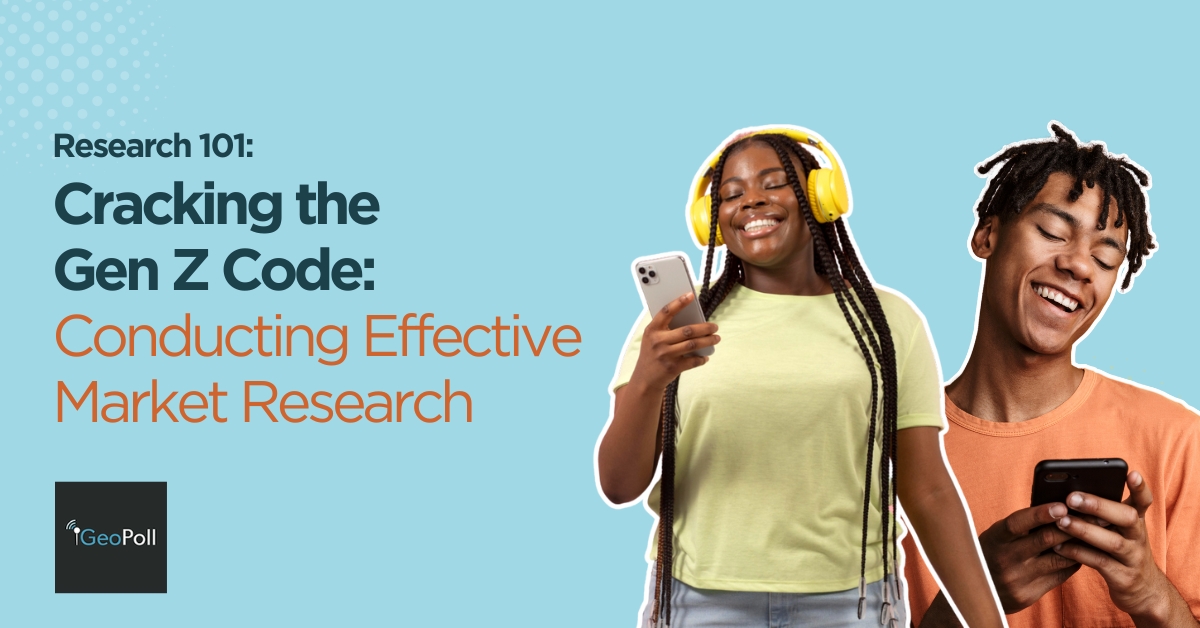Generation Z, born between 1997 and 2012, is reshaping global markets. As the most digitally connected, socially conscious, and diverse generation in history, Gen Z is not just influencing cultural trends, they are defining them. Their purchasing power is growing rapidly, making them a critical audience for brands.
Yet, reaching and understanding Gen Z requires a fundamentally different approach to market research. Traditional methods often fall flat with this audience, who demand speed, authenticity, and mobile-first experiences. This is where GeoPoll plays a unique role.
Why Gen Z Requires a Different Approach
Several set Gen Z apart:
Digital Natives: Gen Z has grown up with the internet and smartphones. They expect seamless, intuitive, and mobile-first interactions.
Authenticity Seekers: They can spot inauthentic messaging instantly and gravitate toward brands with transparency and purpose.
Purpose-Driven: Social impact, environmental sustainability, and ethics influence their brand choices.
Time-Conscious: They prefer concise, engaging interactions over lengthy, traditional surveys. This can be seen also with the media they consume; Gen Z grew up in the era of short-form, snackable content. With platforms like TikTok, Instagram Reels, and YouTube Shorts shaping their daily media consumption, this generation expects information and interactions to be concise, engaging, and instantly rewarding.
Diverse and Inclusive: Gen Z is the most diverse generation yet and expects representation and inclusivity in research and communication.
Traditional research methods, long phone surveys, focus groups, or paper-based questionnaires, fail to resonate with this audience. Instead, companies must embrace mobile-first, real-time, and participant-centered methodologies.
The how
For Generation Z, the smartphone is not just a device but the primary gateway to information, entertainment, and commerce.
This shift makes mobile-first research approaches essential for any company seeking authentic insights from Gen Z. By leveraging channels like SMS, mobile web, WhatsApp, and apps, researchers can meet this generation where they are most comfortable: on their phones. Mobile-first methods not only expand reach into diverse and often underrepresented communities but also enable faster, more natural interactions that resonate with Gen Z’s digital-first mindset. This is how it can be done:
Mobile-First Surveys
Surveys are delivered directly to mobile devices via SMS, WhatsApp, mobile web, and GeoPoll’s app. This ensures accessibility, even in hard-to-reach or rural areas, while meeting Gen Z where they are, on their phones.
Engaging, Short Formats
Instead of long questions surveys, GeoPoll supports micro-surveys and polls that can be completed in minutes. Question types include multiple choice, open-ended, image-based, and multimedia, keeping the experience engaging and authentic.
Advanced Targeting
GeoPoll allows companies to precisely target Gen Z by demographics, geography, psychographics, or behaviors. Whether you want to study urban youth in Nairobi or gaming enthusiasts in Lagos, GeoPoll’s respondent network enables hyperlocal and behavioral segmentation.
Instant Incentives
Gen Z appreciates quick rewards. GeoPoll provides airtime, and mobile money instantly, boosting completion rates and ensuring respondents feel valued.
Real-Time Data Collection
Gen Z’s preferences change rapidly. With GeoPoll’s real-time dashboards and analytics, companies can track shifting trends and respond with agility.
Cultural Intelligence
GeoPoll’s teams in emerging markets understand cultural nuances, ensuring that survey design, incentives, and communication are locally relevant and authentic.
Designing Research That Resonates with Gen Z
To engage Gen Z in ways that feel natural and authentic, companies should adapt their research design with the following principles in mind:
Keep it short: Attention spans shaped by platforms like TikTok and Instagram mean lengthy questionnaires rarely succeed. Instead, focus on micro-surveys with 7-10 highly targeted questions. For broader studies, break them into smaller waves deployed over time. This approach respects Gen Z’s time while still capturing comprehensive insights.
Use their language: Communication with Gen Z works best when it feels authentic. Avoid industry jargon that may confuse participants and resist the temptation to mimic slang that doesn’t align with your brand voice. Instead, adopt a clear, conversational tone that feels approachable and respectful.
Be visual: Gen Z is a visual generation. Incorporating images, emojis, short videos, and interactive elements into surveys makes the experience more engaging and mirrors the way they naturally consume information online. For example, showing product images for feedback or using emojis in rating scales creates familiarity and boosts participation.
Offer value: Participation is more meaningful when respondents see the impact of their input. Share how insights will influence product development, advertising, or social initiatives. Even small acknowledgments—like a thank-you message explaining how their feedback matters—can build trust and encourage repeat participation.
Respect privacy: Gen Z is digitally savvy and deeply aware of data security concerns. They expect transparency around how their responses are collected, stored, and used. Providing clear explanations, consent options, and privacy safeguards is critical for building long-term trust and ensuring compliance with global data protection standards.
Case Example: Mobile Gaming in Africa
To understand gaming preferences across Africa, GeoPoll conducted a study. Within just 48 hours, GeoPoll launched SMS-based surveys in Egypt, Kenya, Nigeria, and South Africa, reaching more than 2,500 young gamers, with the majority being Gen Z.
The study uncovered rich insights, from gameplay habits and spending patterns to the features Gen Z values most in gaming platforms. These findings provided the company with a clear picture of both opportunities and challenges within the African gaming landscape.
By delivering fast, targeted, and mobile-first research at scale, GeoPoll empowered the client to make data-driven decisions that shaped product development, marketing strategies, and regional growth plans. The result was a deeper connection with Gen Z gamers and tangible business impact.
Practical Steps for Companies Targeting Gen Z with GeoPoll
Define Objectives Clearly – Are you testing product concepts, exploring brand loyalty, or measuring purchase intent?
Craft Concise Questions – Use straightforward language that resonates with Gen Z.
Leverage Targeting Tools – Narrow in on the most relevant sub-segment of Gen Z.
Incentivize Participation – Small, instant rewards drive higher engagement.
Act on Data Quickly – Use GeoPoll’s real-time capabilities, to move from insights to action.
The Future of Market Research is Gen Z-Centric
As Gen Z continues to gain purchasing power, companies that invest in understanding them today will be tomorrow’s market leaders.
The future of market research is:
Mobile-first
Real-time
Culturally intelligent
Participant-focused
Conclusion
Gen Z is not the future, they are the present force reshaping markets. Brands that listen, engage, and adapt to their values will thrive. With its mobile-first platform, diverse panels, and deep expertise in emerging markets, GeoPoll is the trusted partner for companies ready to unlock the insights that matter most to this generation.
Ready to connect with Gen Z? Contact GeoPoll today to start your journey.





















